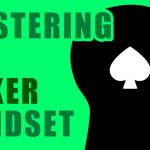In the world of poker, emotions can be your greatest enemy or your most powerful weapon — depending on how well you control them. Every hand, win, and loss tests your ability to stay calm under pressure. While luck plays a role in the short term, emotional discipline is what determines long-term success. Master poker players know that emotional control is just as important as technical skill. The ability to think logically and act rationally, even in the most intense moments, separates champions from amateurs.
Understanding the Role of Emotions in Poker
Poker is a psychological battlefield. Every decision you make is influenced by emotion — fear, excitement, frustration, or greed. When left unchecked, these emotions can cloud judgment and lead to poor choices. A player who lets anger or overconfidence take control is destined to make costly mistakes. Master poker players recognize emotions as natural but learn to manage them effectively. They use self-awareness to prevent emotional swings from interfering with strategy, allowing logic and reason to guide every move.
Recognizing the Dangers of Tilt
Tilt is one of the most destructive forces in poker. It occurs when a player loses emotional control after a bad beat, mistake, or losing streak. Once tilted, players often chase losses, make irrational bets, or abandon solid masterpoker strategy altogether. The first step to mastering your emotions is learning to identify when tilt begins. Are you playing faster than usual? Are you angry or frustrated? When these signs appear, take a break, breathe deeply, or step away from the table. True poker masters know when to pause — because discipline always beats impulse.
Developing a Calm and Focused Mindset
A calm mind is the foundation of poker mastery. Emotional control starts long before you sit down at the table. Practices like mindfulness, deep breathing, or meditation can help train your mind to stay composed under pressure. Before each session, set clear goals — not just to win, but to play your best. Focus on the process, not the outcome. Master poker players don’t let one hand define their mindset. They think long-term, accepting short-term variance as part of the game while keeping emotions balanced and focus intact.
Thinking Like a Strategist, Not a Gambler
One of the defining traits of a poker master is their ability to think like a strategist rather than a gambler. A gambler relies on luck and emotion; a strategist relies on analysis and logic. Every move you make at the table should have a reason behind it — whether it’s a bluff, a fold, or a value bet. By approaching poker as a game of decision-making instead of emotion, you transform chaos into structure. Master poker players constantly ask themselves: “What is the most +EV (expected value) decision here?” That analytical mindset eliminates emotional bias and ensures consistent, profitable play.
Building Emotional Resilience Through Experience
No player is immune to emotional stress. Even professionals experience frustration, but what sets them apart is how they respond to it. Emotional resilience is built through repetition and experience. Every loss is a lesson, and every mistake a chance to grow. By reviewing hands after each session, you can identify emotional triggers and learn how to avoid them in the future. Over time, setbacks become opportunities for improvement rather than reasons for self-doubt. Master poker players don’t fear failure — they use it as fuel for growth.
Separating Results from Decisions
One of the hardest lessons in poker is understanding that good decisions can still lead to bad outcomes. Variance means that even the right move can lose in the short term. Emotional players take these losses personally, while masters focus on decision quality. Instead of asking, “Did I win?” a poker master asks, “Did I play correctly?” This mindset shift is crucial for maintaining emotional stability. When you separate results from decisions, you free yourself from frustration and focus on long-term progress.
Practicing Patience and Emotional Detachment
Patience is one of the rarest and most valuable traits in poker. It allows you to wait for the right spots, avoid unnecessary risks, and capitalize when the odds are in your favor. Emotional detachment means not letting wins or losses affect your confidence. Whether you win a massive pot or lose a tough hand, stay emotionally neutral. Master poker players understand that every hand is part of a larger journey — their emotions remain steady, their minds focused, and their strategies consistent.
Managing Stress During High-Stakes Play
As the stakes rise, so does the pressure. High-stakes poker requires not only advanced strategy but also mental endurance. To manage stress effectively, create a routine that keeps you grounded — adequate rest, hydration, and breaks between sessions. Visualization techniques can also help you prepare mentally for intense competition. By simulating stressful scenarios in your mind, you train your brain to respond calmly when they occur in real games. The best poker masters treat mental preparation with the same importance as technical study.
Learning to Let Go of Ego
Ego is one of the most dangerous emotional traps in poker. When https://masterpoker8.com/ players let pride dictate their decisions, they ignore logic and chase validation instead of value. Master poker players leave ego at the door. They fold when they’re beaten, admit mistakes, and respect the abilities of others. By staying humble, you remain open to learning — and learning is the key to long-term growth. In poker, humility is not weakness; it’s the ultimate form of strength.
Conclusion
To control emotions and think like a poker master is to play with clarity, patience, and precision. Emotional discipline transforms poker from a game of luck into a game of mastery. Every decision should be driven by reason, not reaction. When you manage your emotions, you gain control over the only thing that truly matters — your mind. The greatest poker players win not because they feel less, but because they think more. Master your emotions, and you’ll master the game.









